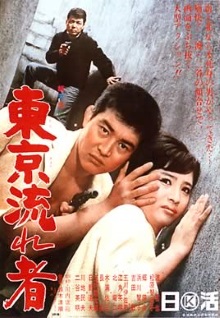
Once again this is a pick that originally came to my attention from a Broken Forum post and subsequently reaffirmed when I realized that it is in the Criterion Collection. At first glance it is nothing special, just a generic Japanese gangster film with a bog standard plot out of hundreds that were produced in the 1960s. But as you watch it, it becomes increasingly obvious how this is a film that must have been far ahead of its time nearly 50 years ago.
Its quirks play out right from the start. It opens in black and white with a scene played so straight that it has to be a deliberate misdirection: a group of gangsters are trying to recruit Tetsuya to their side. He demurs, saying that he and his boss Kurata are reformed, and passively submits to a vicious beating. But then the scene ends, the screen positively explodes with colour and you realize you’ve been snookered.
Tetsuya all but prances around in a blue suit and white shoes, singing his signature theme song to musical accompaniment. At one particularly surreal moment, his arrival upon a fight is foreshadowed by the music starting up and the bad guys react accordingly. The main villain wears a red jacket with black sunglasses as a blatant instance of being colour-coded for your convenience. The colour craziness extends to the sets and camera placement too. This is clearly a director having fun with experimenting with how far he can push things.
At this point it’s worth noting that the director Seijun Suzuki had been making yakuza films for years prior to this and the studio had warned him about his progressively ever more bizarre experiments. For Tokyo Drifter, they drastically cut his budget to force him to make a more normal film but instead he doubled down on the weirdness. The lack of budget probably explains why scenes don’t flow well and the story seems to inexplicably jump around.
Overall, I think this film is probably best understood as a precursor to the style-over-substance, comic book-inspired works like stuff by Sin City and Kill Bill. It’s great fun to watch and never gets boring. Even if the plot is predictable, what you see on screen is anything but. And it certainly makes an impact as a film that is very different from the norm. Just by watching it, you can tell how it has inspired directors like Quentin Tarantino, John Woo and Wong Kar-wai.
Still, it’s probably of more interest to film historians than regular film buffs. The lessons it teaches have been well assimilated into the language of cinema and is better replicated in more modern films. Apart from its sense of style and arguably a catchy theme song that is unfortunately played to death here, it has little going for it.
One thought on “Tokyo Drifter (1966)”